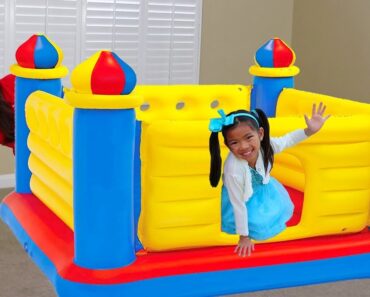Children are, for sure, the cutest beings. But there are times when they can irritate you with their bad habits.
A bad habit is repeated behavior that may not be socially appropriate and acceptable. Although most children outgrow bad habits, you should be mindful of a few habits that may be underlying signs of stress, boredom, frustration, insecurity, or tiredness (1).
While trying to address a bad habit, if a parent can focus on the cause rather than the habit itself, it becomes easy to handle it.
Read this post as we acquaint you with some common bad habits in kids and give you a few handy tips to prevent them.
15+ Bad Habits In Kids
1. Thumb-Sucking
The habit of thumb–sucking starts soon after the baby is born and continues until the age of two to four years. While many babies stop sucking their fingers naturally by the age of two to three years, others might need intervention.
The main reason for thumb-sucking is the natural sucking reflex in babies that makes them keep their thumb or fingers in the mouth. Initially, sucking their thumb makes them feel secure, and later, it becomes a habit in some children. They try to do it whenever they need soothing or while going to sleep.
Although thumb sucking might not be a concern until you see the child’s permanent teeth forming, if the child continues the habit, it might affect the teeth line up and lead to other dental problems.
How to prevent thumb-sucking?
- If your child is of understandable age, try to explain why the habit is bad and offer them rewards whenever they stop doing it.
- If the habit is a reaction to some kind of stress, try to identify it and offer comfort to the child in other ways.
- If your child is doing it unconsciously, gently remind them and ask them to stop the habit.
2. Nail-Biting
Not just children, but also adults have a habit of biting their nails when they’re stressed. If the childhood habit of nail-biting isn’t corrected at the right time, it would continue until adulthood and become an addiction.
According to the US-based Nemours Foundation, an estimated 30–60% of children and teens bite one or more fingernails (1).
Even though the actual reason or cause for nail-biting is unknown, many believe that it results from stress and anxiety.
How to prevent nail-biting?
- If you agree that your child is biting nails due to stress or some tension, try to address the cause.
- If it’s not due to stress, try to keep the child’s hands busy. Apply some nail polish or engage them in some handcrafts, such as playdough and papercrafts.
- For older children, try to explain why they should not bite their nails, and ask them to try to stop it.
- When they’re trying to stop the habit, praise them and try to reward them.
3. Lip-Biting/Sucking/Licking
If you frequently find your child’s lower lip chapped or dry, it could be due to the lip-sucking habit.
The main reasons for the habit are dry lips, anxiety, or misalignment of teeth. When the lips are dry, children tend to lick or suck the lips to moisten them.
Also, when they’re new to any environment or feel stressed, they tend to suck or lick their lips unconsciously.
In some cases, if the upper teeth protrude over the lower teeth, it might result in lip biting or sucking. This is a dental problem and needs to be corrected.
Persistent lip-sucking or biting might result in red, swollen, and irritated lips and skin around the mouth. It might also cause pain and discomfort and lead to lip tissue damage in some cases.
How to prevent lip-sucking?
- For older children, apply lip balm or petroleum jelly to treat dry and chapped lips.
- If they’re under stress and biting their lips, try to comfort them and divert their attention.
- Encourage them to drink more water to prevent dry lips.
- Give them sugar-free candies to distract them from the lip-sucking habit.
4. Nose-Picking
One of the common habits in children of all age groups is nose-picking. Children may develop the habit due to mucus build-up or due to boredom.
Besides the social stigma associated with nose-picking, the habit might also result in nose bleeds or introduce bacteria and viruses into the nose.
How to prevent nose-picking?
- For older children, gently tell them that nose-picking does not look good in public. Encourage them to use a tissue.
- For younger children, put on mittens or hand gloves to prevent them from picking their noses.
- Cut their nails to prevent bleeding and infection inside the nose.
- If you find their nose dry, apply saline drops, humidifier, or nasal gel in the nose to keep it moist.
- Try to keep them busy doing arts and crafts using their hands.
5. Hair-twirling
Although not very common, hair twirling is another habit children have as a result of stress or boredom. Try to notice it right before their bedtime as it’s the time for them to wind up.
It is one of the self-soothing activities commonly seen in toddlers around the age of three. In general, it would naturally subside by the age of four (1).
However, if your toddler exhibits other signs along with hair pulling or twirling, such as not talking and getting lost in their thoughts while pulling their hair, it might be a cause of concern.
How to prevent hair-twirling?
- If your child has long hair, it could make the habit even worse. Thus, it would be appropriate to give them a nice short haircut.
- Keep them busy in other activities that they might be interested in, such as dancing and cycling.
- Talk to them and try to convince them to stop doing it.
- If it is a result of stress, try addressing the cause of the stress first rather than the habit.
6. Teeth-Grinding
According to the Nemours Foundation, two to three children out of ten have the habit of teeth-grinding or clenching of jaws (2). Medically called bruxism, teeth-grinding generally happens when children are in a deep sleep or under stress.
Other reasons for the habit include teething, misalignment of the upper and lower teeth, and pain. While most children outgrow the habit once they lose their baby teeth, others continue the habit into adolescence.
How to prevent teeth-grinding?
- Identify the cause before trying to stop the habit. Anything related to teething and a sore muscle is temporary.
- Stress-related bruxism can also be avoided by addressing the cause. Talk to your child about the things that are upsetting them or making them stressed, and help them find a way out.
- In some cases, a dental visit might be of help.
- If teeth-grinding occurs before sleep or during sleep, make them relax before bedtime by offering a warm bath or reading a book.
7. Excessive Screen Time
Children try to imitate adults, and when we use our smartphones, tablets, laptops, and other gadgets excessively, they would naturally pick the habit up. Moreover, offering a smartphone or a tablet has become a way to calm down a fussy child, feed them, or keep them busy.
When your children spend more time before the screens, watching videos, or playing video games, it might affect their well-being.
As 90% of brain growth happens before the age of five, letting the kids explore the environment around them is extremely important (3). If they stick to screens, they would be less interested in their environment, which would interfere with their learning ability.
The American Academy of Pediatrics (AAP) recommends that children below 18 to 24 months should be allowed screen time only when a parent or caregiver is present. For preschoolers aged two to five, it recommends screen time of just an hour per day (4).
How to prevent the habit of excessive screen time?
- Ensure your children use smart devices only for educational purposes.
- Keep them busy with other fun activities so that they do not ask for smartphones.
- Talk to them and set limits.
- Watch the content on smart devices together so that you can explain to them what they’re seeing. You can comment, ask questions, and make the sessions more engaging.
- Practice what you preach and set the right example. Limit your phone usage before your children.
8. Bad Eating Habits
Bad eating habits could encompass not eating proper meals, eating too many sugary foods, such as chocolates and ice creams, consuming junk food, and skipping breakfast.
Not eating nutritious food may lead to health issues, and not correcting their poor eating habits would lead to bad food choices in later life.
How to prevent bad eating habits?
- If your kid skips a meal, try to include their favorite healthy snack or food during that time.
- Try to offer a variety of foods so that they have a choice. Include fruit, carb-based food, and protein.
- If they refuse to eat, do not force-feed. Let them be, and let their hunger take them to food.
- Keep them physically active so that they burn more calories and feel hungry.
- Schedule meals so that they will get used to their food timings.
9. Touching Private Parts
Trying to explore body parts, including private parts, by touching, rubbing, pulling, or poking, is common in young children. This behavior is seen in children of two to six years.
As they grow a little older, you might notice certain sexual behavior in them, such as looking or trying to touch someone else’s private parts, showing their private parts to others, sitting close to someone, and being curious about others’ naked bodies.
All these acts are done out of curiosity and are harmless in most cases. With some intervention, these can be corrected.
How to prevent children from touching private parts?
- Teach your child about body parts. Tell them the names of all the parts, including the genitals. Do not give any other names as it might make them believe there is something wrong with these parts.
- Also, tell them which parts are private in simple terms, such as the parts covered by a swimsuit.
- Explain to them that it’s not okay to look at or touch someone else’s body parts, and let others do the same to you.
- For younger children, make sure you dress them appropriately to avoid contact with their private parts.
- Teach your child about good touch and bad touch.
10. Frequent Lying
Whether it’s your young child telling you that they have not kicked their older brother or your older child telling something about the homework, children are likely to lie at some point or the other.
According to the Child Mind Institute, children lie for various reasons — not just to get something they wish or avoid doing something. They may be lying to try out a new behavior, gain everyone’s approval, become the center of focus, or just out of impulse (5).
If the change is sudden, you might feel concerned about the behavior. However, if you can understand the cause of the behavior, you can correct it before it becomes worse.
How to prevent your child from lying?
- If your child tells some fancy stuff just to gain attention, it’s better to ignore such conversations instead of questioning them. Once you ignore such theatrics, they would understand that you do not believe in what they are saying at that moment.
- If they lie to avoid some work, you can always make it a point that there will be consequences for such acts. However, make sure the punishments are gentle, such as doing some household chores and reducing screen time.
- If they lie because they’re afraid of something, try to remove the fear first, and then the habit will automatically subside.
11. Using Bad Words
Using bad words is a habit that kids typically pick up after attending school. You might be wondering where they’re learning all these words. Once they start meeting different kids and people, it’s natural that they pick up such habits.
How to prevent your child from using bad words?
- Don’t panic the very first time you hear your child using a cuss word.
- Try to ignore it in the very first instance.
- If it happens again, stay calm and try to talk to them. Make them understand that using such words is not allowed.
12. Talking Back
This habit is common once your child grows up and starts to gain a certain sense of independence. Once they start feeling independent, they get a feeling that they know everything, and as a result, they start responding aggressively even to simple requests.
Even though this behavior might drive you crazy, it’s your reaction that will decide the outcome, for better or worse.
How to prevent your child from talking back?
- Don’t raise your voice as soon as your child talks back.
- Try to stay calm and move the conversation forward in a gentle tone.
- Ask your child if everything is fine and the reason for them being irritated.
- You can also remain silent for some time until they realize their mistake.
13. Bad table manners
Burping, fake vomiting, speaking with food in the mouth, stabbing food, and chewing food with the mouth open are some bad table manners that children display at some point when they are growing up. If you have observed your kid indulging in such acts just because they feel it’s funny, try to control them before the habit becomes worse.
How to teach your child to mind their table manners?
- Try to explain to your kids why such things are wrong and not socially acceptable.
- Ask them to follow the elders at the table.
- Teach them to respect food.
14. Uncontrolled anger
Tantrums are common in children as young as two to three years. They exhibit this behavior when they don’t get what they want. While most children outgrow this behavior by the time they go to school, for some, it continues and leads to anger issues.
Common triggers for anger and irritability in children include not getting what they want and doing something they dislike.
How to manage uncontrolled anger in your child?
The way you respond to an angry child makes a huge difference in correcting their behavior.
- Whenever they’re angry because they didn’t get what they want, don’t give it to calm them.
- Try to ignore the tantrum and remain silent until they realize their mistake. Don’t reply harshly or try to punish them.
- Let them know that there would be consequences for such behavior.
- Be consistent in your efforts. Once they understand that such behavior is not appropriate, they will try to change on their own.
15. Procrastination
Whether it is their regular homework or some household chore they’re supposed to do, postponing things is a common habit among children. This might happen as they are not interested in the tasks or are too busy in their games and other stuff. Some kids are even too lazy to do the work on time.
How to prevent procrastination?
- Tell them why postponing is not a good habit and show them examples of people in the family who do their work on time.
- If it’s because they’re not interested, try to make it enjoyable by adding some fun elements to it.
- Schedule their activities so that they don’t spend their entire time in games.
- Compliment them when they finish their tasks on time.
16. Complaining
Children sometimes complain about almost everything to avoid certain places or people. For instance, when they don’t like going to school or don’t like a fellow kid or a particular food.
How to prevent the habit of complaining?
- Be patient until your child gets accustomed to a new place or new people.
- Explain to them that it is not the right way to behave and that they should make compromises and sacrifices at times.
We hope these tips help you correct your child’s bad habits. Remember that these habits are natural in children, and they usually outgrow most of them. All you need to do is ensure you learn the underlying causes and try to nip the habit in the bud.
































